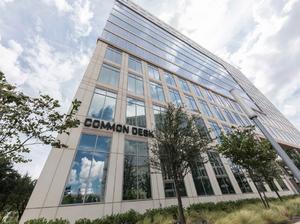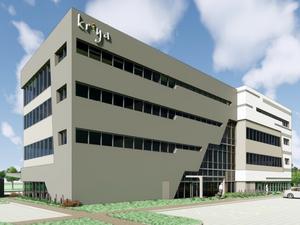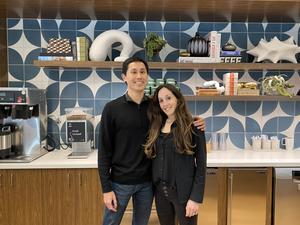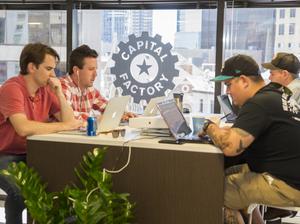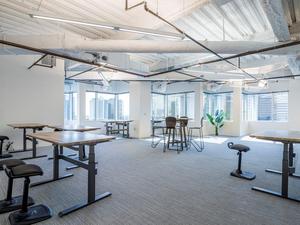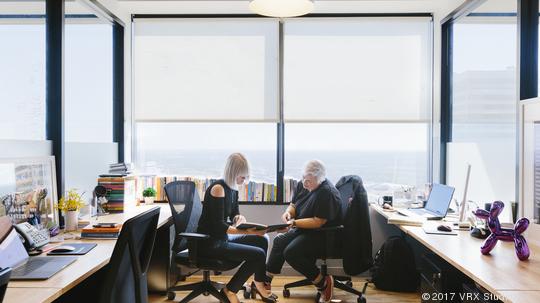
Social distancing, limited public gatherings and an uncertain economy: three things that early on in the pandemic that could have seemingly spelled the end coworking, an industry that relies on many people working in close proximity.
However, based on conversations with local industry leaders, that was not the case. And throughout the challenges of the pandemic, a number of coworking space operators have expanded their reach across the region and the U.S. Now, they’re focusing on the attributes of their companies and of DFW that allowed them to thrive, and looking at what that could mean for the future of the industry and the companies that rely on it.
“I think that this pandemic, not just in coworking but in all of business, it’s accelerated Darwinism. If some business model or some company was teetering on the edge before this, it puts the nail in the coffin,” Flip Howard, CEO at WorkSuites, told NTX Inno. “But if you were doing strong before… you’ll come out on the other side.”
In addition to national brands like WeWork and Florida-based Venture X, North Texas is home to more than a dozen coworking space operators. Some are single, independent operations like Work214 and Good Coworking, while others like Common Desk and WorkSuites operate multiple locations across the region.

Not all coworking operators in the region have managed to navigate the current crisis. In June, Seattle-based coworking startup The Riveter closed its doors in Dallas and eight other cities, citing the “devastating” effects of the pandemic. Then in October, Her.HQ, a local female-focused coworking space closed for similar reasons. That announcement was followed by Capital Factory closing its Dallas coworking space in mid-November.
The initial impact of the pandemic
While those announcements came months after a global pandemic was declared, every coworking operator NTX Inno spoke to said the initial lockdowns that came in the wake of the declaration emptied many of their spaces.
“We went from revenue increase to expense decrease. I hate to get it down to the basics… that was it. That’s what you have to do,” said Jason Anderson, the Dallas-based president of Venture X. “We cut all kinds of fun, crazy, unique initiatives – things that did not relate to revenue.”
However, spaces weren’t entirely forced to closed. Since coworking spaces deliver mail to their clients, as they were deemed essential businesses Anderson said. But like many places, all cut their in-person events and programming and stepped up safety measures with things like hand sanitizer stations, increased cleaning and removing some chairs from common areas to allow more distance. Some places like Common Desk implemented more creative ways to retain clients, with a virtual work-from-home membership.
“Knowing the pandemic will affect how we interact for a while, I think every owner will have to rethink what is our floorplan, where are we going to put our big emphasis as far as our membership offerings, and do we need to change the way we design and build out our spaces based on the way that we all now have to work,” said Megan Kaye Marti, head of marketing at Common Desk.
North Texas as a coworking hub
Throughout the course of the pandemic, Venture X, WorkSuites and Common Desk have all added new spaces in North Texas, with the latter opening spaces in other Texas cities, as well as in North Carolina.
Operating in Austin, Houston and DFW gives Marti some insight into what sets the local region apart. She said that while Houston is more similar to Dallas, in terms of coworking, Austin spaces are about $100 more expensive per month. Although, the company recently dropped its prices there to help attract and retain more customers.
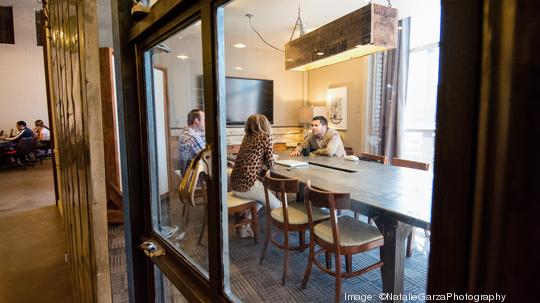
Marti also noted the geographic and demographic spread of the North Texas region, something that was echoed by both Howard and Anderson. They said the DFW market isn’t entirely centered around its downtown cores like other regions, meaning aided by demographic studies of areas they are looking to build, the companies find the right mix of private office to common space in each location. In addition, Anderson said that with the region continuing to grow, new markets are popping up on cities around the edge of the region, like The Colony.
“Dallas’ shared space market is less CBD-driven, less downtown driven,” Howard said. “Downtown locations in a lot of places are struggling. Dallas is much more suburban and spread out. Also… this pandemic has accelerated the move of both companies and individual people to here. Many individuals are moving here because they’re working remotely anyway.”
Of course, coworking leaders also mentioned the “business-friendly environment” in Texas, which for better or worse has also meant that there are less strict lockdown regulations than in major hubs like California and New York. But Anderson notes that the business-friendly attitude has been baked into the region for years, and some of that is now coming to fruition. He said, places like Frisco have planned hubs like The Star development, designed to attract local entrepreneurs and high tech for years. And now those developments are creating density and new opportunities for coworking operators.
“Very few cities have the space, the capacity, the people and the know-how to actually make all that happen as Dallas,” Anderson said. “I think Texas is actually just becoming… the global player I feel it should have been 10 years ago .Texas has been primed for this and has all the right people, players and resources to make that happen. And Dallas specifically is very uniquely positioned to capitalize on that.”
The business of coworking gets creative
Beyond the region, the companies NTX Inno spoke to all attribute a large part of successfully navigating the pandemic to their business models, which depart from leasing a long-term space than turning around and subleasing that to different tenants. Long before the pandemic, WorkSuites was focused on private office space. Common Desk uses landlord partnerships, in which landlords pay Common Desk to turn their spaces into coworking offices. While Venture X is owned by the United Franchise Group, franchising out its location. Though Anderson notes the company has helped its franchisees navigate by stepping in to help with marketing, lead generations and rent negotiations, allowing them to keep all of their locations across the U.S. open.
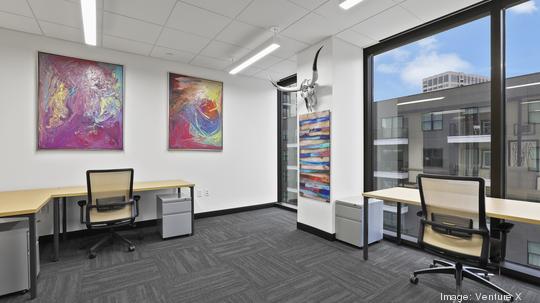
“I think that every owner is going to have to get really creative and really innovative, and that’s something that we at Common Desk have taken really seriously, especially… when we had a few months of downtime, pausing our in-person operations. We had a little more bandwidth to predict what’s going to happen, what will this turn into,” Marti said. “Every owner and every operator is going to have to reassess what works and what makes sense.”
While some pandemic pivots, like WFH memberships and removed chairs, are temporary fixes. And as local coworking operators have opened new locations, the new spaces themselves and the memberships being offered there hint at the future of coworking spaces. Nearly every new coworking space that has opened in the recent month has heavily, if not entirely focused on private office space. New membership offerings largely include the use of the terms “flex” or “hybrid.”
The future is flex
Whether its new come-and-go offerings to private offices, team bundles that combine day pass bundles, hybrid or flex spaces are the focus of many coworking companies looking to capture new clients’ needs created by the pandemic. Howard said while WorkSuites has seen a number of tenants leave due to financial circumstances arising from the crisis, new deals have remained relatively steady – a sentiment echoed by Marti.
“I was surprised in the middle of the pandemic how many people were still shopping for office space,” Howard said. “It wasn’t like our sales numbers ever looked bad, it was just that our occupancy was getting lower because so many people were going out of business who officed with us.”
However, some of the new clientele is changing from what coworking spaces saw before. Some of those are individuals working from home looking to get out of the house or students looking for a quiet space to tune into virtual classes. Some local startups NTX Inno spoke with recently said if they were looking to lease coworking space now they may be a bit more hesitant to sign long-term leases, which coworking operators have been handling with more short-term, flexible offerings.
“It’s there, it’s in your neighborhood it’s a community you can go month-to-month. Once someone gets into it, you’re not going to go back,” Anderson said. “I think the pandemic has really sped up what would have taken another five years for people to realize about flexible office space and more importantly office space in general.”
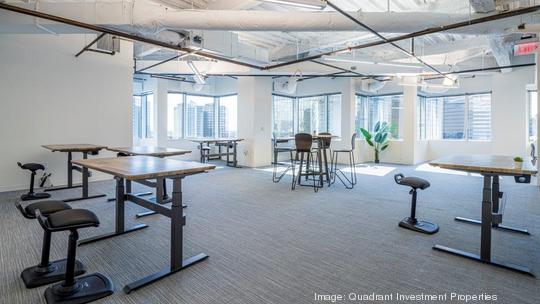
One of the biggest trends coworking companies have seen isn’t with individuals or small startups though. It has been with larger enterprise companies. As many companies embrace fully- or partially-remote teams, they are looking for places where distributed teams can collaborate and meet in their own communities while cutting back on the costs of having large physical office spaces. Howard said many of the companies coming to WorkSuites recently are looking more at how many people they have in the space at one time, rather than on total team size. The trend can be seen in large companies leasing space in flex spaces, like Microsoft’s plan to take up space at VariSpace’s Southlake location.
“It’s going to help them continue to keep a pulse on the community and that human connection that we all realized we needed more than we maybe thought we did… so that these bigger companies can continue to attract and maintain high talent, especially if they’re national and have a wider footprint,” Marti said.
Anderson said he believes in about 10 years, about half of all coworking spaces will be flex spaces, about 20 percent higher than most predictions. And with flexibility comes creativity. While Anderson said he eventually sees conventional coworking with large common spaces eventually making a comeback, the future of coworking operators will start to look a little like the hospitality industry, with companies having multiple sub-brands based on the level of quality and service they need. Howard agreed, comparing the industry's future to similar to that of restaurants - different varieties, different price points. However, he does caution that anyone who thinks they have their workspace figured out is “jumping the gun.”
“I think the industry is going to start to morph and blend all those concepts together,” Anderson said. “If I had to guess, that’s what the flexible office space industry is going to look like. You’re going to have one two or three major brands with sub-brands underneath them that, depending on where you’re at or the type of financing structure, is going to determine what concept goes there.
“It’s really combining all of the different tools and resources under one single umbrella… that way everyone gets the benefit of a bigger ecosystem without having to recreate the wheel.”
